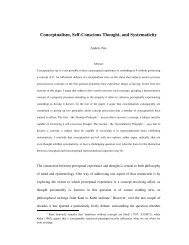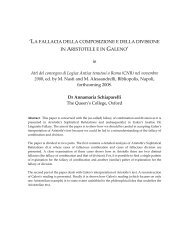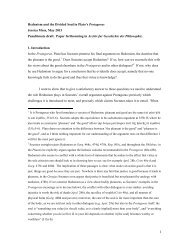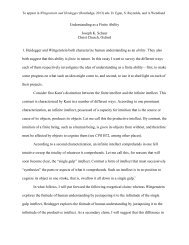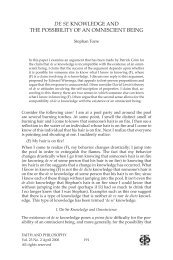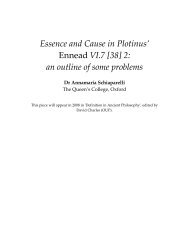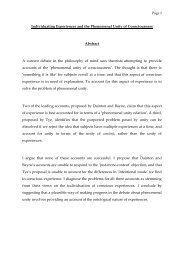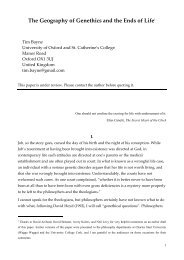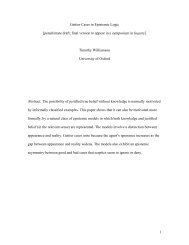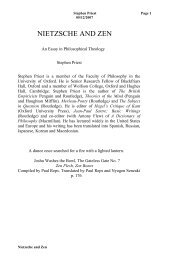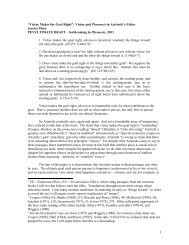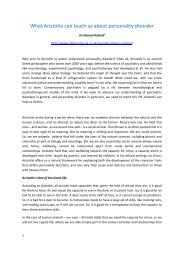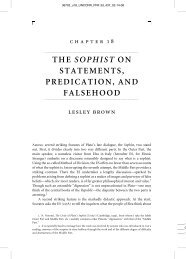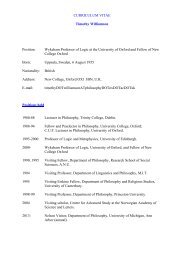Between Saying and Doing: Towards an Analytic Pragmatism
Between Saying and Doing: Towards an Analytic Pragmatism
Between Saying and Doing: Towards an Analytic Pragmatism
Create successful ePaper yourself
Turn your PDF publications into a flip-book with our unique Google optimized e-Paper software.
Br<strong><strong>an</strong>d</strong>om<br />
metal<strong>an</strong>guages, as Tarski forcibly reminds us, we typically need a metal<strong>an</strong>guage that is more expressively powerful<br />
th<strong>an</strong> the object l<strong>an</strong>guage to which it is addressed. One example of a claim of this shape in the case of<br />
pragmatically mediated sem<strong>an</strong>tic relations—though of course it is not expressed in terms of the<br />
machinery I have been introducing—is Huw Price’s pragmatic normative naturalism. 14<br />
Price<br />
argues, in effect, that although normative vocabulary is not reducible to naturalistic vocabulary,<br />
it is possible to say in wholly naturalistic vocabulary what one must do in order thereby to be<br />
using normative vocabulary. If such a claim about the existence of <strong>an</strong> expressively<br />
bootstrapping naturalistic pragmatic metavocabulary for normative vocabulary could be made<br />
out, it would evidently be <strong>an</strong> import<strong>an</strong>t chapter in the development of the naturalist core program<br />
of the classical project of philosophical <strong>an</strong>alysis. It would be a paradigm of the sort of payoff we<br />
could expect from extending that <strong>an</strong>alytic project by including pragmatically mediated sem<strong>an</strong>tic<br />
relations.<br />
The me<strong>an</strong>ing-use diagram of the pragmatically mediated sem<strong>an</strong>tic relation of being a<br />
pragmatic metavocabulary illustrates a distinctive kind of <strong>an</strong>alysis of that relation. It exhibits<br />
that relation as the result<strong>an</strong>t, by composition, of the two basic me<strong>an</strong>ing-use relations of PVsufficiency<br />
<strong><strong>an</strong>d</strong> VP-sufficiency. A complex MUR is <strong>an</strong>alyzed as the product of operations<br />
applied to basic MURs. This is me<strong>an</strong>ing-use <strong>an</strong>alysis. The same <strong>an</strong>alytic apparatus applies also<br />
to more complex pragmatically mediated sem<strong>an</strong>tic relations. Consider one of the pragmatist<br />
criticisms that Sellars addresses to the empiricist core program of the classical <strong>an</strong>alytic project.<br />
It turns on the assertion of the pragmatic dependence of one set of practices-or-abilities on<br />
<strong>an</strong>other. Because one c<strong>an</strong>not withhold a commitment that one c<strong>an</strong>not undertake, given that he<br />
thinks part of what one is doing in saying how things merely appear is withholding a<br />
14 “Naturalism without Representationalism” in Mario de Caro <strong><strong>an</strong>d</strong> David Macarthur (eds.) Naturalism in Question<br />
[Harvard University Press, 2004], pp. 71-90.<br />
LL1 Text.rtf 18 11/8/2007



